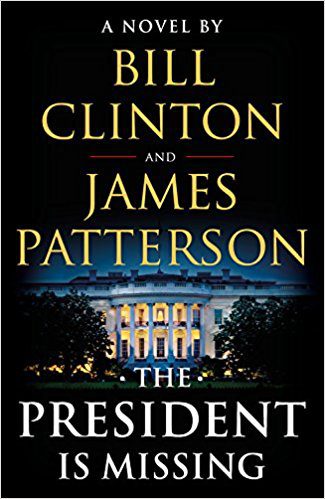James Patterson is a well known writer of thrillers, and many times on the NY Times and other best seller lists. This time he has teamed up with a surprise co-author. Bill Clinton! (Yes, that William Jefferson Clinton). I do not recall other previous presidents writing thrillers, but in any case, this one is a corker! I could not put it down, even though it weighs in at well over 500 pages.
Here is the brief summary of the novel on Amazon—–
“The President Is Missing confronts a threat so huge that it jeopardizes not just Pennsylvania Avenue and Wall Street, but all of America. Uncertainty and fear grip the nation. There are whispers of cyber-terror and espionage and a traitor in the Cabinet. Even the President himself becomes a suspect, and then he disappears from public view . . .
Set over the course of three days, The President Is Missing sheds a stunning light upon the inner workings and vulnerabilities of our nation. Filled with information that only a former Commander-in-Chief could know, this is the most authentic, terrifying novel to come along in many years.”
Cyber-terrorism is all too real these days, including Russia’s obvious meddling in our last Presidential election, but this is far from just a novel for geeks and hackers. It deals with some of the most profound signs of moral deterioration in our culture. For example, consider this passage….
“Participation in our democracy seems to be driven by the instant-gratification worlds of Twitter, Snapchat, Facebook, and the 24 hour news cycle. We’re using modern technology to revert to primitive kinds of human relations. The media knows what sells– conflict and division. It’s also quick and easy. All too often, anger works better than answers; resentment better than reason; emotion trumps evidence. A sanctimonious sneering one-liner, no matter how bogus, is seen as straight talk, while a calm, well-argued response is seen as canned and phony. It reminds me of the old political joke: ‘Why do you take such an instant dislike to people? It saves time.’
“What happened to factual, down the middle reporting? That’s hard to define anymore, as the line between fact and fiction, between truth and lies, gets murkier every day.
“We cannot survive without a free press, dedicated to preserving that fine line and secure enough to follow the facts where they lead. But the current environment imposes serious pressures on our journalists, at least those who cover politics, to do just the reverse– to exercise their own power and to, in the words of one wise columnist, ‘abnormalize’ all politicians, even honest, able ones, often because of relatively insignificant issues.
“Scholars call this false equivalency. It means that when you find a mountain to expose in one person or party, you have to pick a molehill on the other side and make it into a mountain to avoid being accused of bias. The built-up molehills also have large benefits: increased coverage on the evening news, millions of retweets, and more talk-show fodder. When the mountains and the molehills all look the same, campaigns and governments devote too little time and energy debating the issues that matter most to our people. Even when we try to do that, we’re often drowned up by the passion of the day.
There’s a real cost to this. It breeds more frustration, polarization, paralysis, bad decisions and missed opportunities. But with no incentive to actually accomplish something, more and more politicians just go with the flow, fanning the flames of anger and resentment, when they should be acting as the fire brigade. Everybody knows its wrong, but the immediate rewards are so great, we stagger on, just assuming that our Constitution, our public institutions, and the rule of law can endure each new assault without doing permanent damage to our freedoms and way of life.” (pp. 59-60). These are the words of President Duncan of North Carolina, and I could not have said it better myself. Our country is in a bad place. The question is— will we do something about it, rather than simply continuing to exacerbate our growing polarization?













